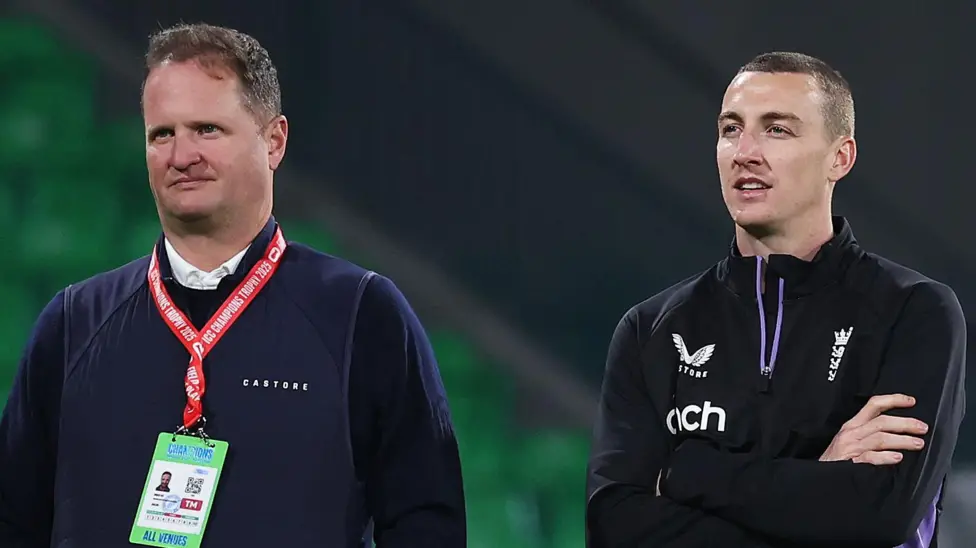
Harry Brook: England’s Gambler Key Rolls the Dice on White-Ball Captaincy
Rob Key, Brook and the Calculated Captaincy Gamble
It says a lot about Rob Key’s approach to leadership that a man who once played poker into the early hours with Shane Warne is now making one of his boldest cricketing bets yet. Appointing Harry Brook as England’s new white-ball captain might seem like a roll of the dice to some, but for Key, it’s a wager grounded more in logic than luck.
As the managing director of England men’s cricket marks his third year in charge, it’s safe to say he’s never been shy of a bold move. Appointing a fiery all-rounder as Test captain? Check. Hiring a red-ball coach with zero Test captaincy experience? Check. Backing untested talents in high-pressure situations? Absolutely.
But this latest decision – installing 26-year-old Brook at the helm of England’s limited-overs teams – feels like a more cautious, calculated gamble. And that’s what makes it so fascinating.
Brook Over Stokes: Playing the Odds Wisely
Key’s alternative, he’s admitted, was to hand the captaincy reins to Ben Stokes. But stacking more responsibility on the injury-prone all-format talisman could’ve proved disastrous. With the Ashes looming and Stokes already a key figure in England’s red-ball revival, risking burnout was a bet Key couldn’t afford to make.
Instead, he’s backed Brook – a player who, despite some recent struggles, clearly has the potential to grow into the role. And crucially, he’s young, hungry, and already central to England’s plans across formats.
Other domestic captains, such as Sam Billings and James Vince, may have had the experience, but not the guaranteed place in the starting XI. Joe Root was never a serious contender, while others lacked the consistency. Brook, in many ways, was the only real option.
Brook Captaincy, Rob Key Decision
Brook’s elevation to the role is not just about succession planning or filling a leadership vacuum. It’s about identity. Brook has been one of the leading figures in the Ben Stokes-Brendon McCullum Test revolution. His style is aggressive, fearless, and front-footed – a perfect fit for England’s brand of white-ball cricket.
He’s not the polished, media-savvy operator some fans might expect from a modern captain. Brook is straight-talking, grounded, and in many ways, refreshingly unfiltered.
At the IPL, he didn’t shy away from addressing criticism, saying he was happy to “shut up” local fans who had doubted him. Last year, when questioned about some reckless England dismissals, his reply was a blunt, “who cares?”
The Making of a Street-Smart Leader
Brook’s cricketing education didn’t come from elite academies alone. Sure, he spent time at Sedbergh School – known for producing top talent – but it was at Hodson Park in Burley-in-Wharfedale where his real schooling took place. Playing against hardened veterans in Yorkshire’s men’s leagues from the age of 13, Brook developed the kind of street smarts that no textbook could teach.
He’s got grit. The kind that sees you run laps through the Cumbrian fells to prove wrong the critics who once said you weren’t fit enough to make it. That same drive saw him come back from the personal loss of his grandmother last year with a leaner physique and sharper edge – eventually becoming England’s top fielder.
Those experiences have moulded him into a leader who leads by example. Not through flowery speeches or cliched slogans, but by working harder than anyone else.
What Kind of Captain Will Brook Be?
Let’s not forget, this is a player once jokingly described as “dumb” by Ben Stokes – a comment quickly followed by an apology. While Brook might not be a talker, his cricketing brain is anything but slow.
His 317 in Pakistan understandably made the headlines, but look closer and you’ll find more telling performances. Like the 75 in the Headingley Ashes Test, chasing under pressure with the urn on the line. Or the smart field placement that got rid of Cameron Green during the ODI series against Australia.
Those who’ve played under him say he inspires confidence. Jacob Bethell’s instinctive turn to Brook after a wicket at Chester-le-Street said more than any words could.
His tactical understanding, willingness to take risks, and commitment to playing the England way mark him out as a captain in the Stokes-McCullum mould.
The Numbers Game: Workload and Risk
Still, there are concerns. The biggest being Brook’s workload.
England’s calendar is relentless – 11 Tests, 9 ODIs, and 12 T20s before January. That’s without factoring in the T20 World Cup in India and Sri Lanka early next year.
Brook is now an all-format lynchpin and there’s always the danger of mental and physical burnout. He’s young, child-free, and has just skipped this year’s IPL – that buys him some breathing room. But it’s a long road ahead.
Key’s gamble only works if Brook stays healthy and firing. Lose him, and England could be left searching for leadership answers all over again.
Brook’s White-Ball Record: Room for Growth
It’s also true that Brook’s white-ball numbers don’t yet scream “captain material.” One century in the format, an average of just 17.09 from 11 innings this year – those aren’t stats to hang a captaincy on.
But context matters. England have been in flux. The Champions Trophy campaign was disappointing. The tour of India wasn’t much better. Few players emerged with credit, and Brook – like many others – suffered from inconsistency and lack of clarity in role.
Captaincy could be the challenge that sharpens him. We’ve seen that effect before. Think Eoin Morgan. Think Stokes himself.
Betting on the Future
So yes, this is a gamble. But not a reckless one. Brook’s appointment is less about fixing England’s white-ball woes overnight and more about building a team and identity that can thrive long-term.
Rob Key has never been one to hedge his bets. But in Harry Brook, he’s placing his chips on a player with the hunger, talent, and attitude to make it pay.
Brook captaincy may yet prove to be one of the smartest gambles in English cricket’s recent history.
Time – and perhaps the Ashes, the T20 World Cup, and many sleepless nights – will tell.
























































There are no comments yet. Be the first to comment!